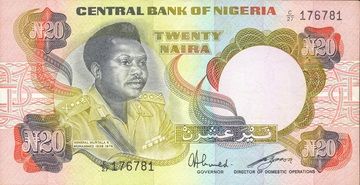The Evolution of the ₦20 Note: A Reflection of Nigeria’s Economy. By Falilat Oreoluwa Dikko

The Evolution of the ₦20 Note: A Reflection of Nigeria’s Economy

On February 11, 1977, Nigeria introduced the ₦20 note—the highest denomination at the time. More than just a piece of currency, it was a symbol of economic strength and national pride. It bore the image of General Murtala Ramat Muhammed, the late Head of State who was assassinated in 1976. His portrait immortalized him as a national hero, and the note itself became a representation of Nigeria’s economic confidence.
Back then, the naira was strong. With just ₦20, one could fill a shopping basket with groceries, pay for transportation across town, and still have some change left. The naira was almost at par with the British pound and even stronger than the US dollar. The introduction of the ₦20 note marked an effort to modernize Nigeria’s monetary system, but it also signaled the beginning of economic shifts that would shape the nation’s financial landscape.

The Fall from Grace
Fast forward to today, and that once-prized ₦20 note is almost worthless. It has been reduced to mere paper—forgotten, insignificant, and devalued. What could once buy a substantial amount is now barely enough for anything. Worse still, the highest denomination today, ₦1,000, cannot even buy a decent meal.
The naira, which once commanded global respect, now struggles against even the weakest currencies. This reality raises critical questions:

What happened to our economy?
How did we go from a nation of financial stability to one where our currency continues to lose value?
More importantly, how do we fix it?
A History of Inflation and Poor Economic Policies
The introduction of higher denominations over the years—₦50 in 1991, ₦100 in 1999, ₦200 in 2000, ₦500 in 2001, and ₦1,000 in 2005—was a response to rising inflation. However, instead of strengthening the economy, these new notes became symbols of its gradual collapse. Each new bill reminded Nigerians that their purchasing power was diminishing.
Economists have long warned about the dangers of over-reliance on a single commodity. Nigeria’s dependence on oil has left the economy vulnerable to global price fluctuations. As Dr. Ayo Teriba once said, “Diversifying the economy is not a choice but a necessity if Nigeria wants to survive the global market.” Yet, year after year, successive governments have failed to take meaningful steps toward diversification.
Corruption, mismanagement, and poor fiscal policies have further deepened the cracks. The Central Bank continues printing higher denominations as if that alone can solve the problem, but history has proven otherwise. Printing money without real economic value only fuels inflation.
Nobel Laureate Milton Friedman famously said, “Inflation is always and everywhere a monetary phenomenon.” This could not be truer for Nigeria. Each time we ignore the root causes of our economic woes—reckless spending, lack of accountability, and over-reliance on imports—we make the situation worse.
The True Cost of a Weak Naira
The decline of the naira reflects deeper structural problems within the Nigerian economy.
High unemployment rates mean fewer people have disposable income.
Struggling industries lead to more reliance on imported goods.
Soaring cost of living makes basic necessities increasingly unaffordable.
A currency is only as strong as the economy backing it. Without industries, without strong local production, and without sound financial policies, the naira will continue to fall.
A Wake-Up Call for Nigerians
This crisis is not just about the government—it is about every Nigerian. We must ask ourselves tough questions:
Why do we continue to rely on imported goods when we have the resources to produce locally?
How much has corruption contributed to the naira’s devaluation?
How can we hold our leaders accountable for economic mismanagement?
What role can each of us play in rebuilding a stable and prosperous economy?
As the saying goes, “A fool and his money are soon parted.” Nigeria must stop being a fool with its resources. We need visionary leadership and a populace willing to support policies that promote economic growth.
Learning from the Past, Shaping the Future
Looking back at 1977, one cannot help but feel nostalgic for a time when the naira was strong and Nigeria’s economy was thriving. But nostalgia alone will not fix our problems. If we do not learn from history, we are doomed to repeat it.
Former Finance Minister Dr. Ngozi Okonjo-Iweala once said, “It is not just about the money we have but how we manage it that determines our economic future.” These words ring truer than ever.
To restore the naira’s value and strengthen our economy, Nigeria must:
1. Diversify the Economy – Reduce dependence on oil by investing in agriculture, technology, and manufacturing.
2. Promote Local Production – Encourage Nigerians to buy and produce locally.
3. Tackle Corruption – Strengthen institutions to fight corruption at all levels.
4. Implement Sound Economic Policies – Adopt policies that promote stability and growth.
As individuals, we also have a role to play. Supporting local businesses, spending wisely, and demanding transparency from our leaders are steps in the right direction.
A Call to Action
The story of the ₦20 note is more than just a tale of currency—it is a reflection of Nigeria’s economic journey. We have moved from prosperity to struggle, but that does not mean all hope is lost. Just as the naira can regain its value, Nigeria can rise again.
The real question is: Do we have the courage to face the hard truths and make the necessary sacrifices to rebuild our economy? Or will we continue on this dangerous path until our currency becomes utterly worthless?
There was a time when people spoke of Nigeria as “the Giant of Africa.” Today, that title feels hollow. How can we be giants when our economy is crippled by poor leadership? How can we claim greatness when our youth are fleeing the country in search of better opportunities because the naira cannot sustain their dreams?
This is not just a call to action for our leaders—it is a call for every Nigerian. We must demand accountability. We must invest in local businesses, support homegrown industries, and reduce our reliance on foreign goods. We must learn to live within our means as a nation.
As I write this, I feel both sorrow and hope. Sorrow for what we have lost, but hope for what we can still achieve. The naira may have fallen, but Nigeria does not have to fall with it. We have the resources, the talent, and the resilience to rise again.
Dr. Ngozi Okonjo-Iweala once said, “Nigeria has everything it needs to be great. What we lack is the discipline to manage it well.”
Let us find that discipline. Let us rewrite the story of the naira and, by extension, the story of Nigeria.
The ₦20 note may have lost its value, but its history reminds us of a time when we believed in the power of our nation. Let that memory drive us to action. Let it be a symbol of the Nigeria we strive to rebuild—a Nigeria where our currency, and our people, once again command respect.
Are we ready to rise to the challenge?
Falilat Oreoluwa Dikko, author and public affairs analyst writes from Lagos Nigeria 13th February 2025




